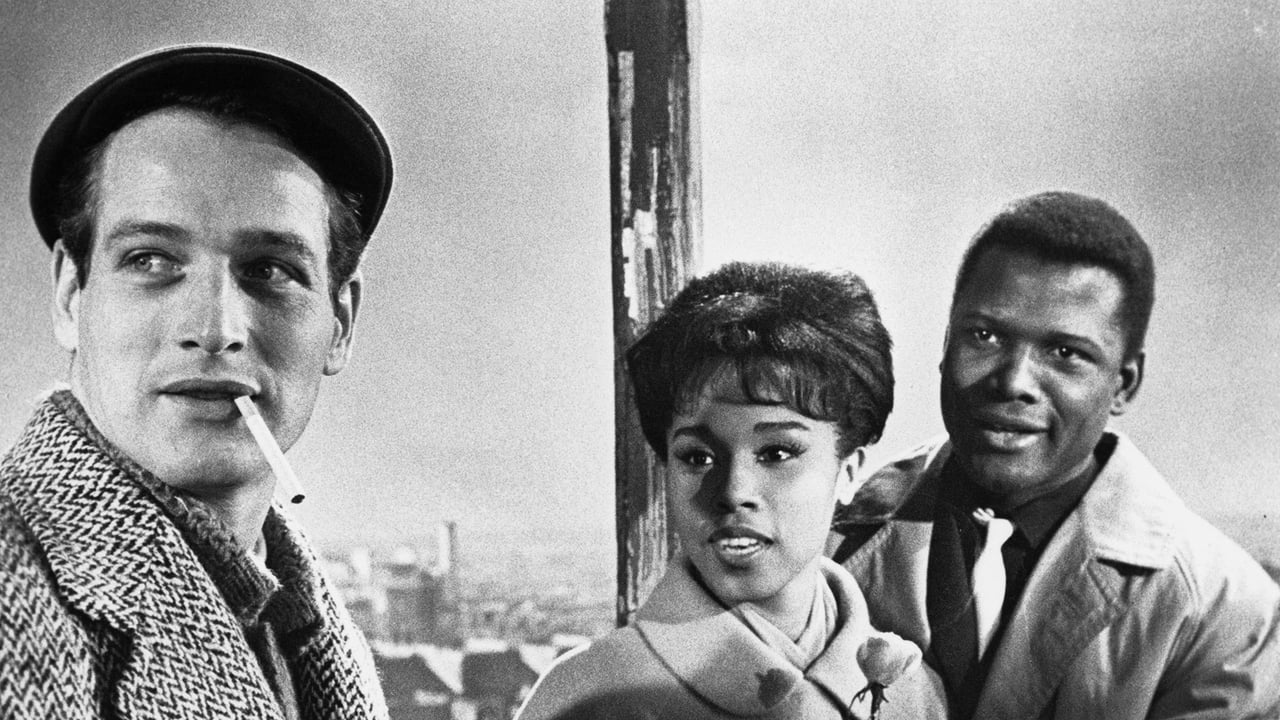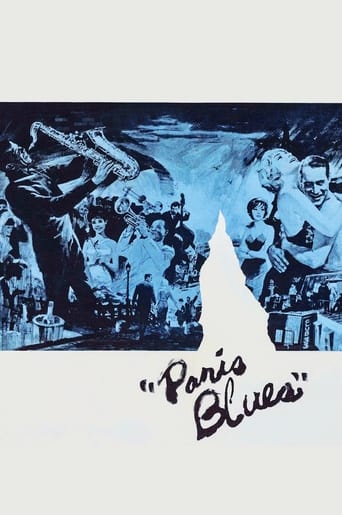



A very feeble attempt at affirmatie action
There are moments in this movie where the great movie it could've been peek out... They're fleeting, here, but they're worth savoring, and they happen often enough to make it worth your while.
View MoreThere is, somehow, an interesting story here, as well as some good acting. There are also some good scenes
View MoreThere are moments that feel comical, some horrific, and some downright inspiring but the tonal shifts hardly matter as the end results come to a film that's perfect for this time.
View MoreI'm sure there are people who will like watching Paris Blues. Paul Newman fans, or Sidney Poitier fans, or those who like Paris or jazz music, but even though I'm 2 for 4, I found too many problems with the movie to enjoy it.First of all, even though Paul Newman made a career out of playing "the bad boy", he didn't really pull it off this time around. He and Sidney are nightlife jazz musicians. They are supposed to be seedy, bad quality, different-dame-a-night swingers. Then why did both of them look incredibly clean cut, with never a hair out of place? I just didn't buy it when they'd say, "Can you dig it?" It felt like they were in a movie parodying the 1960s and they didn't know what they were talking about.Second, Joanne Woodward and Diahann Carroll play girlfriends on a two-week Paris vacation. They're not even off the train when Paul hits on Diahann, completely ignoring Joanne, who incidentally looks prettier than she usually does. Joanne is taken with him, so they go the low-life dive nightclub where he works and listen to him play. Once again, Paul hits on Diahann and is incredibly rude to Joanne. He pushes her away repeatedly and tells her to find someone else for what she wants. But Joanne wants to be an incredibly stupid woman. Seriously, what's her problem? She just arrived in Paris! There are nightclubs and seedy musicians everywhere—what's so special about Paul Newman? He's downright mean to her constantly. She knows where he stands. But he's the one for her? Both romances are quite stupid. Diahann and Sidney are awkward at best; it's as if they used one take to say their lines in the worst, most comical way possible, and that's the take the director kept. Joanne and Paul are mismatched; sometimes star-crossed lovers are a good plot point, but in Paris Blues it's just badly written. Throughout the entire movie, she's incredibly stupid, but she comes up with spur-the-moment zingers that don't fit her character."I told you from the beginning, I'm not on the market," Paul says. With a look that's supposed to be smoldering, but just comes across as confused, Joanne says, "I wasn't shopping," before leaving the room. I wasn't amused.
View MoreHandsomely shot on location in Paris, Sidney Poitier appears as second player to Paul Newman's tense jazz musician Ram Bowen. Like a jazz piece, the film meanders at times, content to get where it's going without overt dramatic flourish, something which both helps and harms the film. Containing relatively sophisticated themes for Hollywood cinema, it nevertheless falls into the trap of being a serviceable film rather than a great one, a string of incidents in need of a more rigid plot.The tagline for the film promised "A love-spectacular so exciting you feel it's personally happening to you", whereas the reality is, you'll probably just think it's happening to Newman and Poitier, who both had more significant and historically lasting films that same year. (The Hustler/A Raisin In the Sun). All this said, the cinematography by Christian Matras is beautiful, Louis Armstrong adds fun playing Louis Armstrong (called "Wild Man Moore") and Newman-Poitier is a pretty good screen pairing, even if Sidney does tower over the film's top billed star by five inches. Amusement can be gleaned by the film's conclusion, which sees both dump their girlfriends to be with each other.
View MoreI'll leave the criticism/review of this film to others. I didn't really follow the plot which is rare for me; instead, I was more interested in the music.Of course watching Poitier and Newman fake their way through the music performance sections was of interest. And they did manage to fake it with some success. You can see that Martin Ritt, the director, kept those shots to a minimum, especially when Louis Armstrong was in the house playing with them. Otherwise, too long of a shot of either Newman or Poitier playing would reveal their amateur ability.Armstrong was great in the later scene when his band "comes marching in" and he challenges the soloists in Newman's band to a playoff. And that scene was truly the best, both musically and otherwise in the film. The vitality and musical charm of that scene was great.One note about the storyline and the racial aspects that carried on between the characters, especially Poitier and Carroll, is important for several reasons. As others have said here, the Civil Rights movement in the US was surging ahead, so the significance of the story in the film rings true and is important.But no one seems to have mentioned the fact that Louis Armstrong was also, if not more than any other musician in mid-20th century America, an important victim of racial bias in the US during his career. Go listen to him sing "Black and Blue" and you'll get the idea. To see him here in Paris, where race was not a factor, only reinforces the historical rejection by many in America and the acceptance by many in Europe of jazz and African-Americans during this time.The title of this film, "Paris Blues" is more than just a comment about music.
View MoreI tried to comment on this good film when it was on TCM a couple of days ago. I liked all of the comments except the derisive remarks regarding Ellington, and Strayhorn's relationship, but I digress. Queencheryl, You are right to wonder about the love affairs presented to us in the film. I've read (Music Is My Mistress) that Ellington was primarily interested in the project because the film WAS to have Ms. Carroll and Mr. Newman's characters "getting together" as the main story, and was very disappointed to find out after he...and Strayhorn had written and, worked the scoring, the producers chickened out and changed the screenplay. The music and the on screen appearances of Armstrong are the stars for me. Walking in Paris is cliché, but not doing that there, is like not going to Fisherman's wharf when visiting here. AND WHAT CITY TO HAVE WALKED IN!
View More